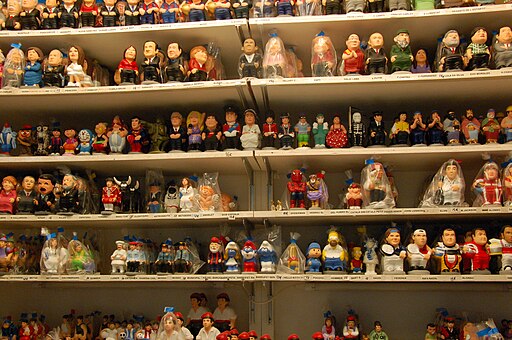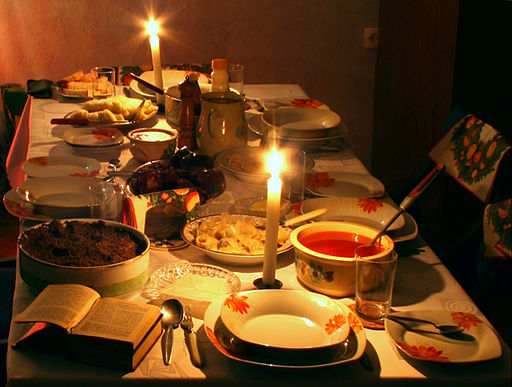As an expat you’re probably relatively familiar with the need to embrace new cultures and traditions when you move to a different country, but do you keep with your own traditions at Christmas, adopt the customs of your host culture, or merge the two? What comes to mind when you think of Christmas?
Is it the, apparently quite normal, spectacle of an overweight bearded gentleman in a fur-trimmed red coat dragging an enormous sack while squeezing his way down chimneys? Or perhaps you look forward to attempting to fit a fifteen pound turkey in your oven? Maybe your mind wanders to that warm, somehow ‘complete’, feeling of imbibing a glass or three of hot mulled wine with family and friends.
Whatever the Christmas period brings to mind, festive food, figures, activities and traditions differ depending on where you are in the world. While you may find them perhaps a little surprising, they no doubt feel just as natural and traditional to those celebrating them as Father Christmas, turkey, stuffing, and Christmas pud feels to the average Brit!
Here’s our selection of a few of the more unusual Yuletide traditions from around the world:
Worldwide
Let’s start with a relatively recent worldwide phenomenon originating in San Francisco that would make Santa proud!
Each year since 1994 thousands have flocked to the streets in Major cities around the globe for ‘SantaCon’, walking around dressed as the man in red, or other Christmas characters, perhaps singing a few carols and visiting pubs for a swift noggin or three. In 2006, in Moscow, a record 70,000 Santa’s took to the streets!

Germany, Austria and Eastern Europe
Being a bad boy or girl on the run up to Xmas doesn’t just get you a piece of coal in your stocking. Instead, you’ll be scared out of your wits by a visit from ‘Krampus’ on December 5th. This half goat, half demon comes armed with rusty chains and bells.
In Germany, children leave a shoe outside the house on the 5th December and on Christmas Eve a pickle is hidden within the branches of the Christmas tree. Good children get sweets in the shoe, and bad children get a tree branch stuffed in their footwear. The child who finds the pickle first gets a gift from Santa, the first adult to find it gets good luck for the next year.
Greece
Greece is unfortunately plagued with Goblins called Kallikantzaroi during the twelve days of Christmas. Beginning on Christmas day the Kallikantzaroi, distracted from their habitual task of attempting to unseat the earth by sawing down the ‘lifetree’, return to Earth to cause mischief including ruining food, breaking things, and urinating in the flowerbeds.
To ward off these miscreants, many Greek households replace the Christmas tree with a cross wrapped in a sprig of basil hung on a wire above a wooden bowl. Dipping the basil wrapped cross in holy water and sprinkling it around the house each day protects the household against the Kallikantzaroi. You will also find May Greek households with Cullenders on their doorsteps at night as, apparently, the Kallikantzaroi become confused and stalled at the doorstep while trying to count all the holes.
Brazil
In Brazil, it’s popular to take part in a local version of ‘Secret Santa’ (Amigo Secreto). The amigo secreto gives small gifts each day in December using a false name, revealing their true identity on Christmas Day.

China
While the majority of the worlds plastic Christmas trees are made in China, only about 1% of the population are Christians, so Christmas celebrations tend to be limited on the whole to larger cities.
A tradition that is becoming popular is to give apples wrapped in coloured paper on Christmas Eve. It is thought that this is because Christmas Eve in Chinese is Ping’an Ye (peaceful evening – from silent night) which is close to Ping Guo; the Chinese for apple.
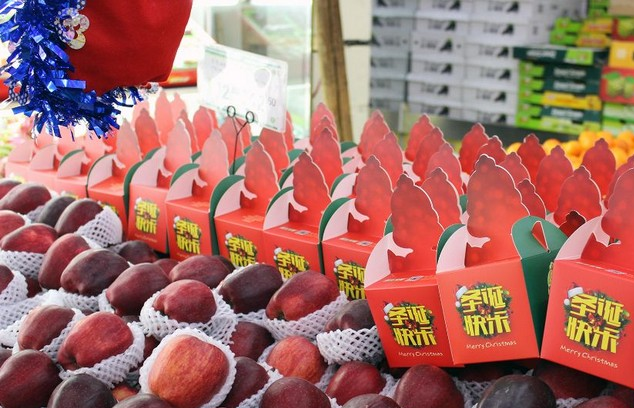
Japan
Surprisingly, in Japan, the dish of choice on Christmas Day is Kentucky Fried Chicken.
The story goes that a group of visitors to Japan in 1974 couldn’t find a turkey dinner on Christmas day, so opted for chicken instead, and KFC took the opportunity to do some ingenious marketing, launching a campaign called ‘Kurisumasu ni wa kentakkiii’ (Kentucky for Christmas).

KFC promoted a Christmas special including Chicken and Wine, and it went down so well with the Japanese that an estimated 3.6 million celebrate with a KFC bucket filled with KFC, cake and champagne to this day.
South Africa
Even more unusual than the Japanese preference for KFC, December is when a rare cracker-pulling delicacy is in season in South Africa; deep-fried Emperor moth caterpillars.
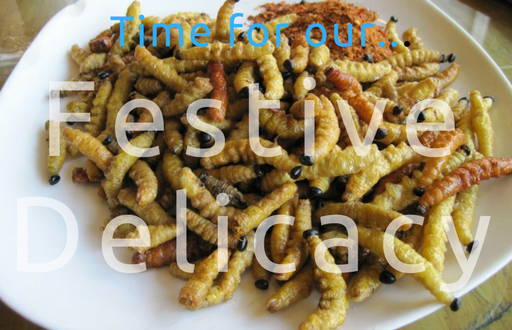
Yum!… Pass the gravy.
Greenland
The traditional festive dish in Greenland makes deep-fried caterpillars sound positively appetising.
Taking a full seven months to prepare, Greenland’s seasonal delicacy ‘Kiviak’ consists of the decomposed remains of five hundred Auks (seabirds). To prepare this dish, hollow out one seal skin, stuff with five hundred Auks complete with feathers, bury it for seven months, dig it up, and serve straight from the seal.

If you’re still a little peckish after taking your fill of Kiviak, you can also sample ‘Mattack’; whale skin and blubber, eaten raw, or deep-fried and served with soy sauce.
Iceland
You’d better make sure you work hard in Iceland and that you spend your hard-earned cash on new clothes. Because, if you don’t the Jólakötturinn or Yule Cat will pounce from his hiding place in the snow and eat you!
Icelanders have tried to avoid the wrath of the Yule Cat by dressing well at Christmas since medieval times when the folklore began as a means of motivating wool workers to get things finished before it got really cold.
And then there’s the ‘Yule Lads’.
These thirteen mischievous trolls live in the Dimmuborgir mountains, and each visits Icelanders during the thirteen days before Christmas dishing out various levels of reward or punishment into children’s shoes left by a window; gifts for the nice boys and girls and rotten potatoes for the bad ones.
Each of the Yule Lads names suggest the trouble they cause; translated they are Sheep-cote clod, gully gawk, stubby, spoon licker, pot scraper, bowl licker, door slammer, skyr gobbler, sausage swiper, window peeper, doorway sniffer, meat hook, and candle stealer.
Norway
Like Halloween, for many Norwegians Christmas Eve is when evil spirits and witches come out to play. Apparently the witches, though, are without brooms so, unless you hide yours they’re likely to steal it! In an effort to prevent festive broom theft the Norwegians have hit on the brilliant solution of hiding all brooms before going to bed on Christmas Eve, leaving the unfortunate witches somewhat bereft of personal transport.
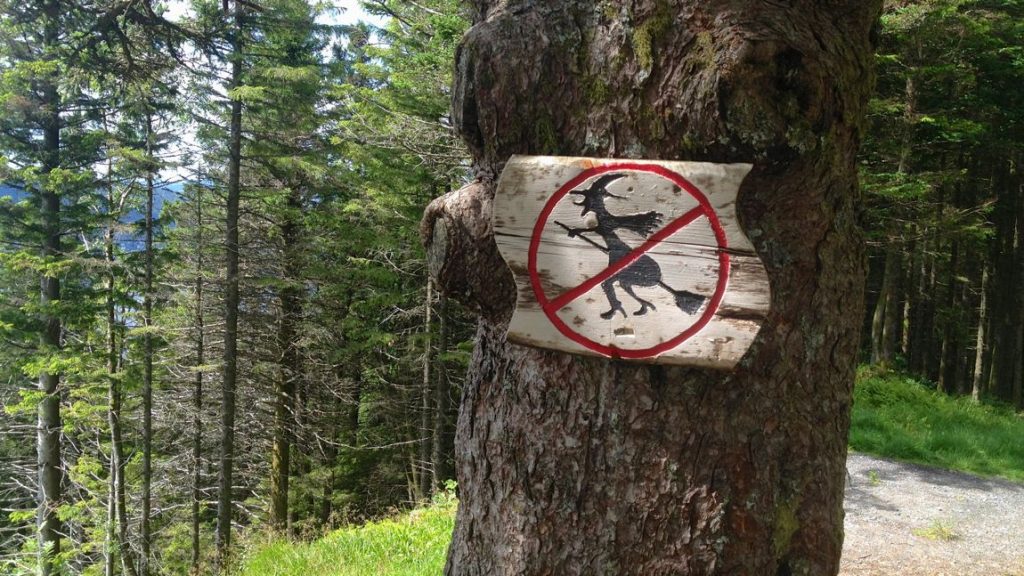
Sweden
From Sweden comes a tradition sparked by a tail of human compassion befitting the true spirit of the season. For the Swedish, one of the biggest celebrations is St. Lucia’s Day on December 13th.
The tradition is based on stories told by Monks who brought Christianity to Sweden about a young girl, Lucia, in Ancient Rome. Lucia secretly took food to Christians imprisoned beneath the city and would wear candles on her head so that she could carry more.
Today, children visit churches, hospitals, rest homes, and schools following a girl dressed as St.Lucia wearing a crown of candles. They sing carols and hand out gingersnaps.
Denmark
In Denmark, there is a porridge obsessed elf going by the names nisse, tomte, or tomtenisse. If you don’t leave out a bowl of rice pudding or porridge, he’ll steal all the children’s presents before they wake.
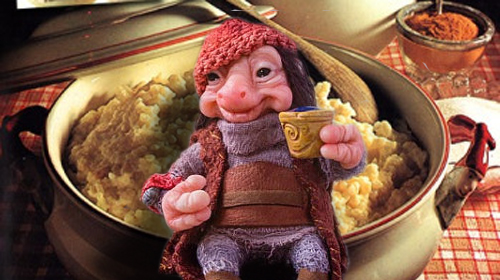
Czech Republic
If you’re a single woman in the Czech Republic and want to know whether marriage is on the cards, then a Christmas Day tradition is to stand with your back to your front door and throw a shoe over your shoulder. If it lands with the toe pointing towards the door, it’s wedding bells next year!
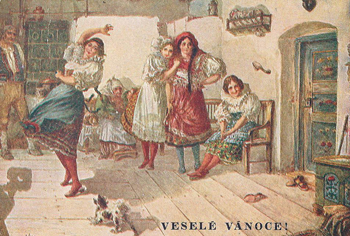
Catalonia
During Christmas many homes in Catalonia bring a whole new meaning to the ‘Yule Log’ by sporting a ‘Caga Tio’, a hollowed out log with two wooden front legs and a face painted on it. From 8th December, children ‘feed’ the ‘pooping’ log. On Christmas day the whole family beats the log with sticks while singing a song asking the log to ‘poop’ out sweets and presents.
The Catalonian predilection with ‘evacuation’ continues with the nativity scene which, in addition to the traditional characters has, in attendance, a peasant taking care of business with his trousers around his ankles. The additional character is ‘El Caganer’ which quite literally means ‘the crapper’.
Poland
In Poland, a seat at the Christmas Eve table is always left vacant. The vacancy is thought to be either left for anyone who is less fortunate or alone at Christmas, for Jesus, for the Holy Spirit, or for the spirits of departed family members.
The meal consists of no less than twelve different courses, one for each apostle. No meat is served. You’ll need to try each of the twelve courses, and each has a tale or tradition connected to it; eating the noodles and poppy seeds, for instance, will ensure your prosperity for the coming year.
Ukraine
Families in Ukraine like to dress their Christmas trees with fake spider’s web rather than tinsel and baubles.
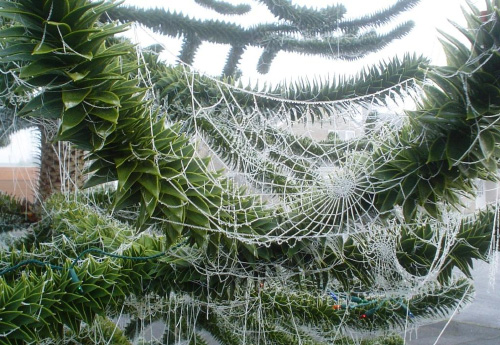
The story goes that a poor family who could not afford to decorate their tree woke up on Christmas morning to find it covered with Spiders webs. When the sun hit the webs, they turned to silver and gold threads. Many Ukrainians practice this tradition to bring good fortune and prosperity.
The Best of the Rest
There are a surprising number of traditions, characters, and practices out there and, if we included them all here, we could go on forever but we felt the following final three were worth a mention.
On Christmas day in Slovakia, the man of the house hurls a spoonful of ‘Loksa’, a popular Christmas desert made from bread, milk, poppy seeds and honey, at the ceiling for future happiness. The more sticks, the better your luck.
In Caracas Venezuela, the locals have a tradition of going to mass early at Christmas wearing roller skates. It has now become so popular that the local government even closes off major roads to traffic.
In Ethiopia on Christmas Day afternoon, Ethiopians like to play a local version of hockey called ‘Gaana’ which, according to local tradition, was played by the shepherds tending sheep when Jesus was born.
A wish is a wonderful thing
While researching this article I couldn’t help noticing that a good number of traditional activities around the world focus on luck, well-being, and prosperity for the New Year. Many people seem perfectly happy to put their trust in luck and folklore rather than actively planning for their future.
While it’s perfectly natural to want to wish for prosperous future, there are steps you can take to ensure a prosperous future because, wishing or not, a secure future doesn’t happen by accident!
Wherever and however you celebrate Christmas, from all of us here at United Advisers to all of you, a very happy Christmas and a prosperous New Year.

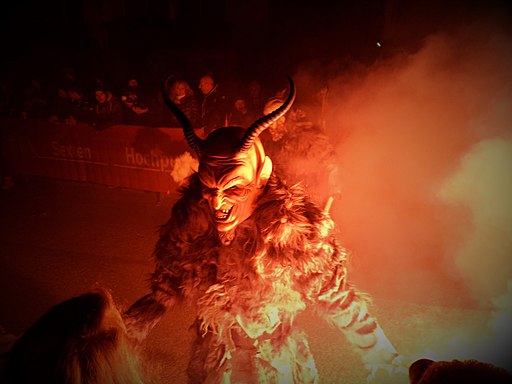

![St.Lucia celebrations in a Swedish church - 13.12.2006 - By Claudia Gründer (Claudia Gründer) [CC BY-SA 3.0], via Wikimedia Commons](https://upload.wikimedia.org/wikipedia/commons/thumb/0/04/Lucia-13.12.06.jpg/512px-Lucia-13.12.06.jpg)
